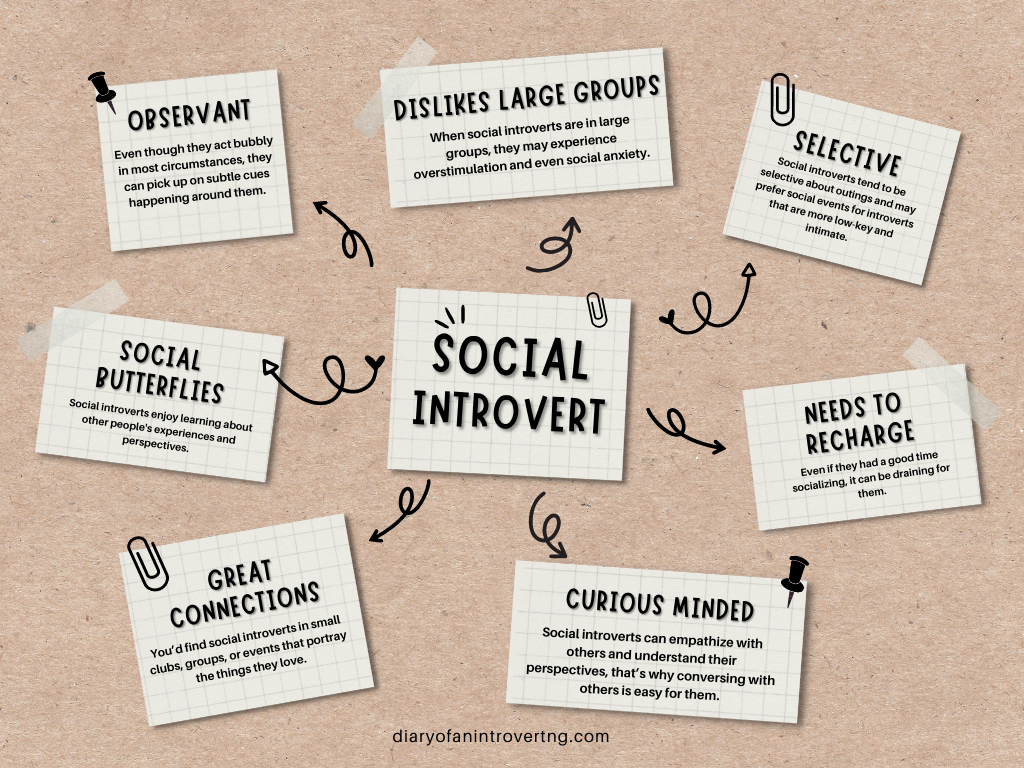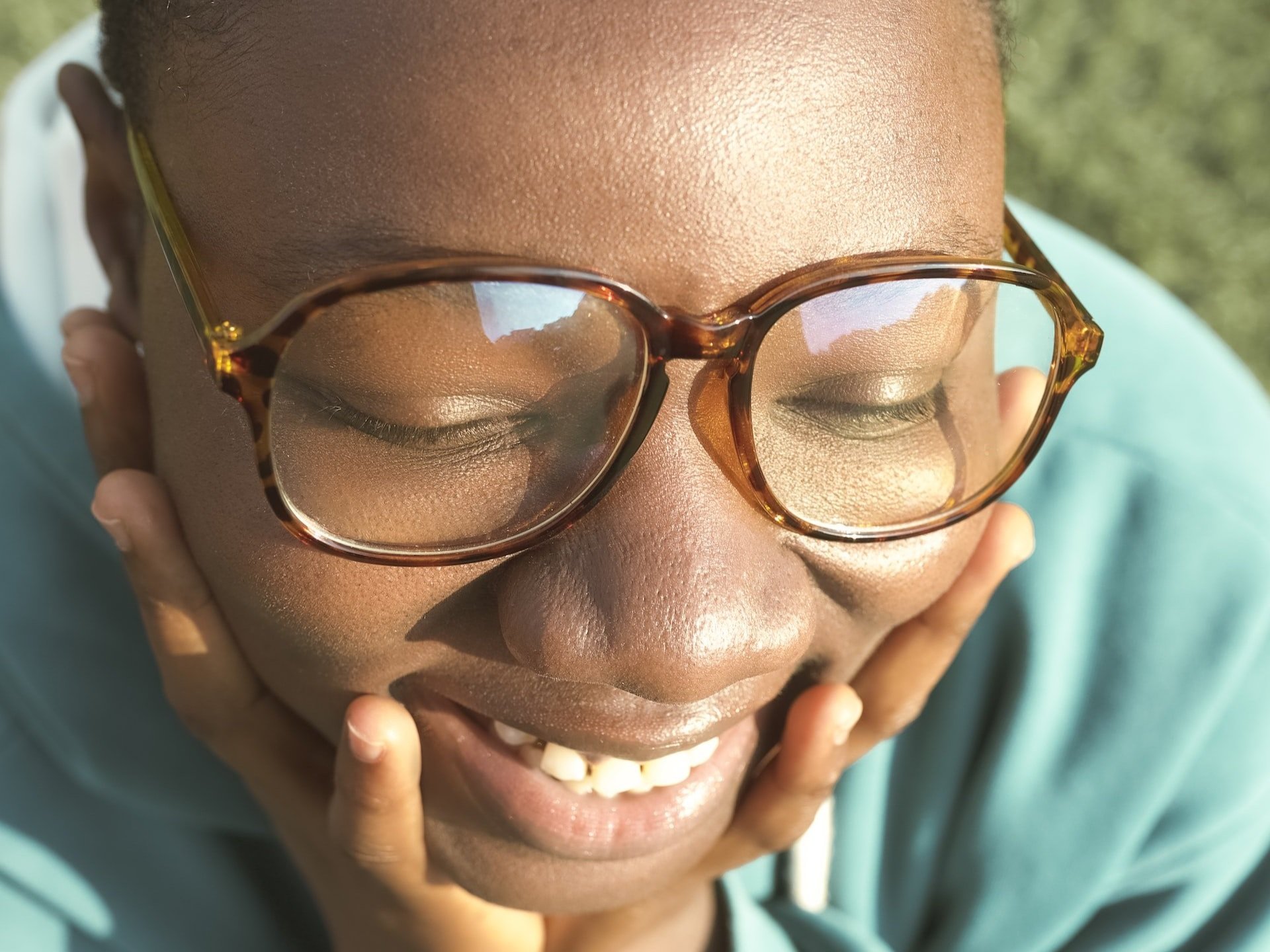20 Super Cool Ways to Spot a Social Introvert
Photo by Joshua Rawson-Harris on Unsplash
Introverts are often portrayed as shy and anti-social.
But that’s far from the truth.
Many introverts actually enjoy socializing, but differently than extroverts.
A social introvert is an introvert that ironically enjoys socializing with others. They still prefer more profound, meaningful interactions with close friends, but like socializing as extroverts do.
In short, someone with a sociable introvert personality enjoys social events more than the average introvert.
While they may feel uncomfortable in large groups, they can be outgoing and sociable in smaller groups where they feel more comfortable.
A Regular Introvert vs. A Social Introvert
The main difference between regular introverts and social introverts is their level of comfort with socializing.
The regular introvert example is someone who likes quiet activities and may feel drained after socializing for extended periods.
On the other hand, the social introvert definition explains that social introverts enjoy socializing with others somewhat similarly to the way an extrovert would.
You can also differentiate regular introverts and social introverts by their assertiveness in social situations.
Regular introverts may feel uncomfortable in social situations and may have trouble asserting themselves. But, social introverts are more comfortable communicating their needs and opinions in social situations.
So, can an introvert be social?
Yes! When you’re with social introverts, you can’t deny how much they enjoy interacting with others. Even if they are prone to overstimulation, they’d still go back for more.
If they don’t feel the excitement that comes with social interactions, they are most likely to break out of their quiet patterns and take social risks. For example, accepting an invitation to a party they would’ve turned down last week.
So, What’s the Difference Between a Social Introvert and an Extrovert?
Don’t be mistaken —extroverts and social introverts have different preferences for socializing.
Extroverts enjoy being around other people, often seeking out social situations and feeling energized by social interaction. They tend to be outgoing, and talkative, and enjoy being the center of attention.
Social introverts, on the other hand, enjoy socializing with others but in smaller groups. They feel drained by social interactions faster than extroverts would. But, it’s necessary to note that a social introvert is indeed a social person.
The best way to tell them apart is that extroverts may feel uncomfortable or bored when alone, but social introverts enjoy solitude and use it to reflect, recharge, and pursue personal interests. That’s why a social introvert is also referred to as an introverted extrovert.
A Social Introvert is not Asocial Introvert
The term "asocial" means that a person doesn’t enjoy or seek out social interaction at all.
It's worth noting that asocial behavior is not the same as antisocial behavior, which refers to behavior that is harmful or disrespectful to others.
When someone says they’re asocial, it simply means they’re not a sociable person.
To understand the asocial vs. introvert comparison, know that asocial behavior and introversion are two separate concepts.
Asocial behavior refers to a lack of interest in or avoidance of social interactions, while introversion refers to a preference for less stimulating environments and a need for alone time to recharge.
Someone who is introverted may still enjoy social interactions and relationships but may need time alone to recharge after socializing (which is where the social introvert meaning comes into play).
On the other hand, someone who is asocial may actively avoid social interactions and may not feel the need for social connection or relationships.
With the introvert vs. asocial comparison, it’s also worth noting that introversion is a well-established personality trait, but asocial behavior is not necessarily a personality trait.
Related: Am I Too Quiet? P.S. No, You’re Not. A How-To Guide to Using Your Introversion to Your Advantage
So how can you spot a social introvert? ..
In one scenario, a social introvert can say, “I am sociable,” while in another scenario, they come off as extremely reserved.
You need to know them to a certain degree to characterize their personality. If you want to, here are 20 traits to look out for:
They are social butterflies when you talk to them personally.
Social introverts enjoy learning about other people's experiences and perspectives.
In one-on-one conversations, they’d ask questions and be more comfortable sharing personal stories to stir up deep, thoughtful discussions that interest them.
They can do this without feeling overwhelmed.
You can also spot a social introvert by how much they enjoy providing support and advice to others when talking to them personally. They feel comfortable doing this once they’ve already built a close bond with someone.
When talking to social introverts, it’s clear that they enjoy more intimate conversations with one or two people, rather than being in a large group.
2. They connect well with their small circle of friends.
You’d find social introverts in small clubs, groups, or events that portray the things they love.
This process happens because they enjoy participating in activities that align with their interests, and with people, they already know.
They’d always look for opportunities to attend small gatherings or events, such as dinner parties or game nights, and connect with others in a more relaxed, low-pressure environment.
Social introverts also use people’s interests, values, or hobbies as a basis for building a friendship.
This way, they attract those that appreciate their personality and values, and build deeper, more meaningful connections over time.
3. They feel pumped for social events but crave their beds soon after.
Even if social introverts have a good time socializing, it can be draining for them.
Social interaction requires a certain level of stimulation and engagement, and for these individuals, this can be overwhelming or overstimulating.
More so, social introverts often process information and emotions more deeply than extroverts, which can also contribute to their need for alone time.
They may need time to reflect on their interactions, process their emotions, and recharge their mental energy before engaging in social interaction again.
So when you spot a social introvert, they can’t hide their state of exhaustion or depletion after socializing. However, this doesn’t discourage them from trying again next time.
4. They are curious and open to discussions.
Social introverts often have a natural curiosity about other people and their experiences, which motivates them to listen actively and ask thoughtful questions.
This trait makes them seem like extroverts, even when they’re not.
Social introverts can empathize with others and understand their perspectives, that’s why conversing with others is easy for them.
They are also patient and take their time to process information before responding. This allows them to listen carefully to what someone is saying, rather than simply waiting for their turn to speak.
By being observant, reflective, patient, curious, and valuing deep connections, they tend to have great connections with those around them.
5. They open up about stuff that ‘matters’ to them.
Social introverts often crave emotional intimacy in their relationships.
This can easily start with meaningful conversations about things that they like since there’s an opportunity to share their emotions and connect with others on a deeper level.
It’s one of the reasons why social introverts find small talk draining. They can strategically use it to incite deeper conversations, but they rarely stick to surface-level interactions.
Since social introverts tend to be authentic and honest in their interactions with others, conversations about things that matter to them are stimulating and rewarding.
You’d be shocked at how much they’d socialize when the topic interests them.
6. They know their limits with large groups.
When social introverts are in large groups, they may experience social anxiety.
That’s why they tend to practice healthy boundaries with others.
If you notice someone who seems like a very social person, suddenly becoming quiet and withdrawn, they might be a social introvert.
With the noise, activity, and constant social interaction, they can quickly become overwhelmed and drained. That’s why they’d rather stick to smaller social groups for introverts.
Larger groups can make them feel self-conscious or anxious about their interactions, even though they’ve been socializing ever since.
They might also find it difficult to engage with others on a personal level and naturally gravitate towards smaller groups.
7. They might seem carefree but are impressively observant.
Social introverts tend to be detail-oriented and observant, noticing small details in their environment and the behavior of those around them.
This happens because social introverts often spend time reflecting on their own thoughts and emotions, which can help them gain a deeper understanding of themselves and others.
So even though they act bubbly in most circumstances, they can pick up on subtle cues happening around them.
You might be surprised when a social introvert mentions something you told them months ago or asks about your well-being when you thought they didn’t care.
But interestingly, their curiosity leads to a greater awareness of their environment and the people in it.
8. They use quiet activities to leverage their social sides.
Quiet activities can be relaxing because they offer a way to socialize and connect with others without the overstimulation and pressure of more active or loud social activities.
Such activities also have a sense of control and predictability.
For example, social introverts may prefer to have a small dinner party with close friends, where they can control the guest list and the atmosphere, rather than attend a large, noisy party where they may feel overwhelmed or out of place.
Quiet activities provide a chance to relax and recharge without completely withdrawing from social interaction. For example, you could spend time reading, writing, painting, watching a movie, going for a walk, having a quiet dinner with friends, or engaging in a hobby such as knitting or woodworking.
9. They are selective about social events.
Social introverts tend to be selective about outings and may prefer social events for introverts that are more low-key and intimate.
They tend to have limited energy reserves for socializing and may need to be selective about the events they attend to manage their energy levels.
This is why they prioritize events that are most important to them or that they find most enjoyable.
Like everyone else, social introverts have personal preferences and will choose outings based on their interests and values. They’d attend the ones that align with their values and avoid those that do not —versus a regular introvert who might not attend any even though they’re interested.
10. They crave friendships with others.
Close friendships give social introverts a sense of community.
Even though they may not seek out large social events, social introverts still benefit from feeling connected to others and being part of a group.
These friendships ultimately help social introverts feel less isolated, and that’s why they cherish them so much.
On the flip side, they are not explicitly self-sufficient. A regular introvert can be comfortable having zero friends, but a social introvert will cling to those they regard as buddies.
It provides a depth of connection and understanding that is often missing from being alone.
Liking this article? Join our Introvert Club→
11. They may prefer online communication.
Social introverts may prefer online communication for a variety of reasons, even if they don't have a problem talking to people face to face.
Online communication provides more control over the pace and depth of their interactions.
They can take time to compose their thoughts and respond in a way that feels comfortable to them.
For some social introverts, face-to-face interactions can be anxiety-provoking, because they are, in fact, introverts.
Online communication can reduce this feeling by providing a level of distance and anonymity that is not available in face-to-face interactions.
It can be done from the comfort of one's own home, on one's own schedule, and without the need for travel or make logistical arrangements (especially when a social introvert wants to conserve their energy).
12. They’re the life of the party in smaller groups.
It is not necessarily "weird" for social introverts to appear like extroverts in small groups.
Many social introverts can engage in social situations effectively, especially when they feel comfortable and are interacting meaningfully.
Social introverts are actually highly skilled at social interactions and tend to enjoy them.
It is important to note, however, that because a social introvert appears outgoing and sociable in small groups does not mean that they are not introverted.
Introversion is not about shyness or social anxiety, but rather a preference for less stimulation and solitude.
Social introverts appear extroverted in small groups, but this does not change their underlying introverted nature.
13. They may not enjoy being the center of attention.
Social introverts prefer to blend in with the crowd.
They’ve learned to engage with others well, but this is not their preferred mode of being around others.
Social introverts don’t necessarily enjoy attention-seeking behavior.
Being a centerpiece superficially may be uncomfortable for them, as it does not align with their preference for depth and authenticity in relationships.
They also find this activity to be draining. They prefer to conserve their energy and spend it in a way that feels more fulfilling to them, such as one-on-one conversations or reflective activities.
14. They have passionate hobbies.
Pursuing a hobby they are passionate about gives social introverts a sense of purpose and accomplishment, which can positively impact their mental health and well-being.
Hobbies are a way for quiet individuals to connect with others who share their interests. So, joining a club that revolves around a particular hobby is something you’d find a social introvert to do.
Such activities are an essential part of their lives and help them balance their need for solitude with their desire for social connection.
Getting invested in a hobby also challenges them to focus and concentrate, which is rewarding to their introspective natures.
15. They may be more comfortable in familiar environments.
You’d catch a social introvert observing people in a new environment before they engage in social interactions. This helps them get a feel for the social dynamics.
Being in a new environment can be stressful for anyone, but social introverts tend to experience a higher level of discomfort due to their preference for solitude.
As such, they’d be more comfortable in environments they are familiar with, such as their own home or a favorite coffee shop.
If they find themselves in new places, they’d take their time to establish a sense of trust with people around before opening up.
16. They may act aloof with new people, and leverage other people’s talking abilities.
Social introverts do not necessarily behave "weird" around new people, but they may behave differently than extroverts or more socially outgoing individuals.
They take some time to warm up to new people which is why hanging around those that have more social abilities is their natural go-to action.
If they’re around new people, they’ll allow their more outgoing friends to start up conversations, while they get comfortable and adjust to the scenery.
This behavior isn’t unusual to them. They are simply exhibiting what they feel is more comfortable and authentic to them.
17. They’re genuine even when they’re socializing, and prefer authenticity in their associations.
Social introverts value authenticity and may be able to pick up on signs that someone is not being genuine or honest.
They may notice if someone is putting on a façade or trying to present themselves in a certain way.
You can spot a social introvert by them staying true to themselves even when being social. That’s why they may be turned off by superficial or fake people.
If someone is quite jovial but naturally dislikes insincere compliments or flattery, they might be social introverts.
They also have a strong sense of intuition and can pick up on subtle cues in a person's behavior or body language that indicate that they are not being genuine.
18. They have a quality-over-quantity rule.
If you’ve ever tried to befriend someone who was seemingly social, but they wanted to build a common ground with you than merely being friends, then that might be a social introvert.
Social introverts prioritize spending time with close friends and family members who they feel a deeper connection with, rather than trying to socialize with as many people as possible.
This approach allows these individuals to focus on building stronger relationships with the people who matter most to them.
By prioritizing quality over quantity, social introverts avoid feeling overwhelmed or drained by too much social interaction.
19. They still have a rich inner life.
Both social introverts and regular introverts tend to daydream, as daydreaming can be a way for introverted individuals to process their thoughts and recharge their energy.
However, it's important to note that being introverted doesn't necessarily mean that someone daydreams more often than others.
Introversion is simply a personality trait that relates to how someone processes information, interacts with others, and recharges their energy, while daydreaming is a common human experience that can happen to anyone, regardless of their personality type.
That being said, some social introverts may find that they daydream more often in social situations where they may feel uncomfortable or overwhelmed, as daydreaming can be a way to escape or cope with their surroundings.
20. They are excellent conversationalists.
Starting up conversations might seem challenging for social introverts, especially in new or unfamiliar social situations.
But, they tend to use several strategies to break out of their quiet states.
For example, they might ask, "What do you like to do in your free time?" or "What kind of music do you enjoy listening to?" just to get someone talking.
They might even ask about the a person's hobbies, interests, or experiences, to look for shared experiences or interests that can bring up discussion.
They are terrific at conversations and would also approach people who look friendly and open, or, look for other cues that indicate that someone is open to a conversation.
FAQs
What is a social introvert?
A social introvert is a person who has a preference for quieter, more low-key social interactions and may find large groups or prolonged socializing draining. Ironically, these individuals still enjoy socializing.
What is the personality of a social introvert?
The personality of a social introvert can vary, but generally, they are introspective, thoughtful, and enjoy deep, meaningful connections with others. They may be comfortable in social situations, but also need time alone to recharge.
What are the 4 types of introverts?
While there is no universally agreed-upon categorization of introverts, some personality theories suggest that there are four main types: social, thinking, anxious, and restrained. Social introverts prefer quieter social interactions, thinking introverts tend to be introspective and reflective, anxious introverts may experience social anxiety, and restrained introverts are reserved and calm.
Is it possible for an introvert to be social?
Can introverts be social? Yes, an introvert can be social. While introverts may prefer less stimulating social interactions, they can still enjoy spending time with friends and family, and may even have strong social skills in certain contexts.
Are social introverts rare?
Social introverts are not necessarily rare, but they may be less common than extroverts or other types of introverts. According to some estimates, introverts make up around 25-40% of the population, and social introverts may represent a smaller subset of this group.
Final Thoughts
Social introverts may not fit the typical stereotype of an introvert, as they enjoy socializing and connecting with others. But, by understanding and appreciating social introverts, we can create more inclusive social environments that cater to a wider range of personality types. Do you think you’re a social introvert? Comment below.
Live Your Best Quiet Life
Get the Am I Too Quiet? book →














